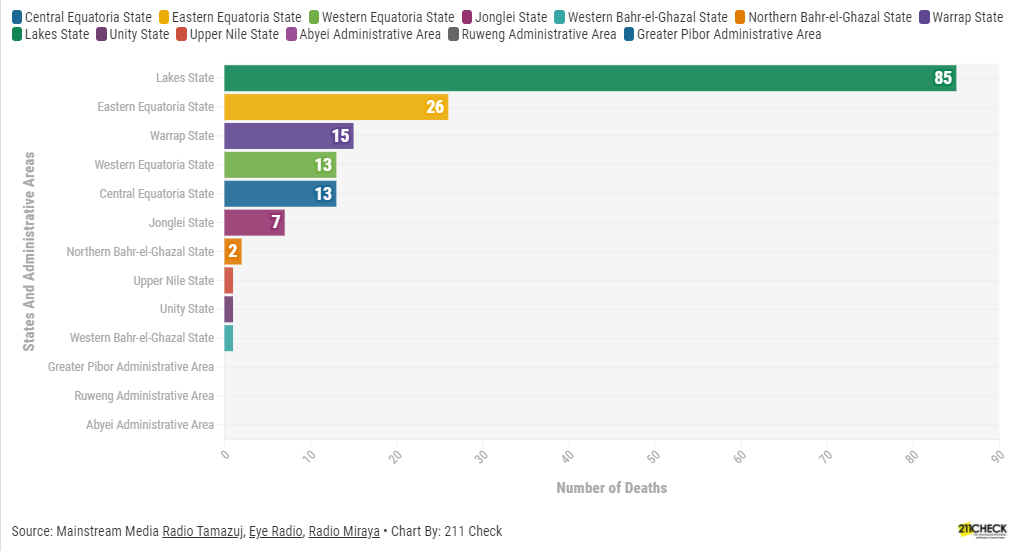June Social Media Health Report: Music discussions dominated the online space, Culture, Politics, and Sports followed.
By Emmanuel Bida
Introduction
This June social media health report constitutes findings gathered from South Sudan’s numerous online pages on Facebook. The report bears rates of interactions by South Sudanese online users in the country and abroad as per various areas of interest.
The discussions observed online in the month of June varied from politics, culture, sports, music and religion among others. This analysis is based on comprehensive day-to-day monitoring of several renowned social media platforms on Facebook as well as additional data obtained from Crowd Tangle Intelligence tool.
The one-month report bears data of interactions on Facebook, most talked-about topics, reactions of online users to different agendas shared online, as well as social media behaviour, among others.
Summary of Page Interactions
In South Sudan, 116 of the 191 pages produced 1,718 posts in the first week of June, averaging 2.12 posts per day. These posts drew the attention of nearly 300,000 Facebook users. The overall number of encounters has decreased by 23.69 percent. 118 of the 191 Facebook sites we track published 1,744 posts, averaging 2.11 per day, with almost 260,000 Facebook users engaging with the content. The overall number of interactions decreased by -19.28 percent in the second week of June. In the third week of June, 2,964 posts were published on 120 of 191 pages, for an average of 3.53 posts per day. With approximately 400,000 Facebook interactions, this was the busiest week yet. The percentage gain was 19.52 percent, with page like growth of 0.86 percent. In the last week of June, 1,944 posts were made on the 113 pages we track, averaging 2.46 each day. The number of people who reacted was a little more than 245,000. The overall number of interactions has dropped by 46.12%.
Key issues of the month:
Key issues of the month as seen below are defined as most topics or events that occurred online, which took netizens’ attention and caused interactions’ traffic among South Sudanese within the country and abroad.
- The death of self-proclaimed Nigerian Televangelist prophet TV Joshua
This was one of the leading stories in the early days of June. Joshua’s death took people by surprise and the below Facebook post by Nyamilepedia took the lead on Facebook, with over 1,500 interactions.
- South Sudan medical doctors’ poor salaries and the delays
Another leading issue that week was a news story by The City Review, in which a medical doctor passed on and his fellow workers attributed his death to the government’s failure to pay wages in a timely manner. The post had nearly 1,000 interactions that day alone.
- Traditional video shared by South Sudanese Australian-based journalist
In the second week of June, a post shared by a South Sudanese Australian based journalist created a huge debate online, which generated thousands of interactions. Ajak Deng Chiengkou shared a video bearing a throwback of him practicing Dinka traditional dance in 2019 – a video that got nearly 3,000 interactions, 1,000 comments and 1,000 shares. It was viewed by nearly 350,000 people on Facebook.
- South Sudanese frustrations over economic hardships and bad governance
On 11th June 2021, Our Diversity – an online platform with over 23 000 followers shared a video of two singers describing South Sudan’s state of the nation, highlighting the hardship citizens have undergone and are still bearing. The video got over 14,000 interactions, 700 comments, and nearly 1,000 shares. Most of the comments praised the artists for being creative enough to talk about South Sudan’s hardships in a musical language. “This is the summary of 10 years of SPLM in power,” reads one of the comments.
- South Sudanese artist meets with Nigerian Stars Davido and Chamedena
One of Junub celebz’s posts, about an alleged anticipated collaboration between South Sudanese singer Chamdena and Nigeria’s Davido, also got many people talking on Facebook, with the post getting over 10,000 reactions, 400 comments, and 30 shares. Many South Sudanese in the comment section congratulated the artist while others disputed the news, saying he was only posing for pictures.
- Happiness and controversies over the ongoing Juba Stadium construction work
Footage of the Juba National Stadium under construction posted by the South Sudan Football Association on 15th June 2021 created an online debate with over 2,000 interactions, nearly 150 comments, and 200 shares. Many comments congratulated the FIFA global and South Sudan Football Association, while a few others raised concerns about the seats, lack of roofs/shade, and conformance to international standards.
- Opposition army chief rejects President Kiir peace advisor position appointment
Radio Tamazuj’s story on Gen. Gatwech’s rejection of the Presidential advisor position got many Facebook users talking. Over 5,000 people interacted with the post, which led to 1,000+ comments, 2,000+ shares and over 110,000 views. Mixed feelings were expressed in the comments with others supporting his decision and some not.
- Foreign Mission highlights the work of renowned traffic officer’s work
In a move to highlight his efforts in controlling the traffic jam, the United States Mission in South Sudan featured popular Juba traffic officer George Kenyi, by sharing a post on the embassy’s Facebook page. The post caught the attention of its followers, where many continue to appreciate George for the dedicated selfless service he has been providing and continues to. George Kenyi normally controls Seven-Day round-about traffic.
- South Sudan’s female football star offered a job
SSDGuna.com – a tabloid media house that focuses mainly on entertainment shared the news of a South Sudanese female footballer Amy Lasu having been offered a job by Liberian club – Determine Girls FC. The post was among the leads that day, with many online users showering her with mob congratulatory messages. The post got nearly 3,000 interactions and over 100 comments including several shares.
- University of Juba student graduates at 66, after spending 44 years studying
In the last days of June, another story that made headlines was that of a man who graduated 40 years after his admission at the University of Juba. The story which was shared by Eye Radio, got over 3,500 interactions, nearly 500 comments, and over 100 shares.
Conclusion
Using Social Media monitoring technologies, discourse, and content analysis, this report looked into the online behaviour of South Sudanese social media users within the month of June. Various conversations took place over the monitoring and reporting period, with the situation in South Sudan continuing to be prominently covered. In addition, graphics, videos, and text were shared online, some of which were hot topics. However, video posts covered the highest interactions rates.
Some of the statements that followed the release of information online, were among the conversations mostly talked about in the public domain. During the monitoring and reporting period, the spread of mis and/or disinformation and hate speech by regulated and alternative media houses did not dominate social media discussions. This can be attributed to #HateFreeSouthSudan and #defyhatenow social media campaigns including the practice of ethical journalism, information fact-checking and verification.
As seen in the leading posts, alternative media content predominates, in terms of what is being discussed online, especially on common social media platforms. Different realities were shared on social media, and as a result, individuals were exposed to a variety of viewpoints.
The report also shows that social media involvement was generally healthy over the monitoring and reporting period. Disinformation, hateful and inciting content, as well as those that directly or indirectly advocate violence against certain communities, have all decreased dramatically.
End…




